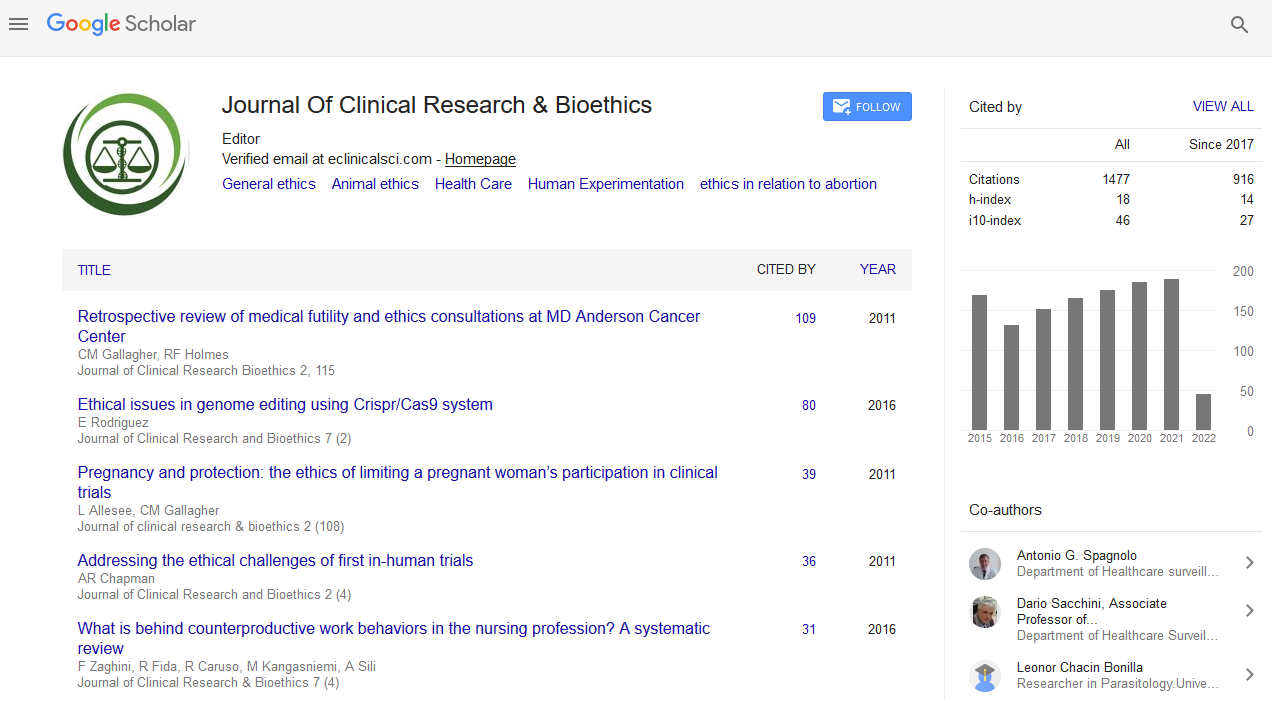PMC/PubMed Indexed Articles
Indexed In
- Open J Gate
- Genamics JournalSeek
- JournalTOCs
- RefSeek
- Hamdard University
- EBSCO A-Z
- OCLC- WorldCat
- Publons
- Geneva Foundation for Medical Education and Research
- Google Scholar
Useful Links
Share This Page
Journal Flyer

Open Access Journals
- Agri and Aquaculture
- Biochemistry
- Bioinformatics & Systems Biology
- Business & Management
- Chemistry
- Clinical Sciences
- Engineering
- Food & Nutrition
- General Science
- Genetics & Molecular Biology
- Immunology & Microbiology
- Medical Sciences
- Neuroscience & Psychology
- Nursing & Health Care
- Pharmaceutical Sciences
LPS induces HUVEC angiogenesis in vitro through miR-146a-mediated TGF-ò1 inhibition
3rd International Conference on Advanced Clinical Research and Clinical Trials
September 20-21, 2017 Dublin, Ireland
Yize Li
Fourth Military Medical University, China
Scientific Tracks Abstracts: J Clin Res Bioeth
Abstract:
Angiogenesis is an essential process for tissue growth and embryo development. However, inflammation, abnormal wound healing, vascular diseases, and tumor development and progression can result from inappropriate angiogenesis. Lipopolysaccharide (LPS) can activate various cells and alter endothelium function and angiogenesis. This study investigated the underlying molecular events involved in LPS-induced angiogenesis and revealed a novel strategy for controlling abnormal angiogenesis. LPS treatment promoted wound healing and tube formation in human umbilical vein endothelial cell (HUVEC) cultures and induced their expression of miR-146a. miR-146a was previously shown to regulate angiogenesis in HUVECs. Knockdown of miR-146a expression antagonized LPS-induced angiogenesis in vitro. Moreover, bioinformatics analyses predicted TGF-β1 as a target gene for miR-146a, which was confirmed by a luciferase reporter assay. Expression of miR-146a in HUVECs resulted in down-regulation of TGF-β1 in HUVECs, whereas a miR-146a inhibitor upregulated the expression of TGF-β1 and TGF-β1 downstream proteins, such as phosphoraylation- Smad2 and plasminogen activator inhibitor type 1 (PAI-1). Furthermore, the TGF-β1 signaling inhibitor SB431542 impaired the ability of miR-146a knockdown to suppress LPS-induced angiogenesis. Thus, LPS-induced angiogenesis of HUVECs functions through miR-146a up-regulation and TGF-β1 inhibition. This study suggests that knockdown of miR-146a could activate TGF-β1 signaling to inhibit angiogenesis as a potential therapy for angiogenesis-related diseases.
Biography :
Yize Li is Doctor at Xijing Hospital, Fourth Military Medical University. She completed her Bachelor degree of Clinical Medicine at West China Medical Center Sichuan University and Master and PhD degree at Fourth Military Medical University. She is skilled in treatment of breast cancer. She focus her research in lncRNA and microRNA and explore the mechanisms of trastuzumab resistance in breast cancer and endothelial cells angiogenesis.


